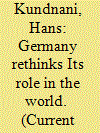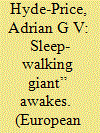| Srl | Item |
| 1 |
ID:
138184


|
|
|
|
|
| Summary/Abstract |
In January 2014, German President Joachim Gauck gave a remarkable speech at the Munich Security Conference in which he exhorted his compatriots to take greater responsibility for solving global problems. He criticized those who “use Germany’s guilt for its past as a shield for laziness or a desire to disengage from the world.” Most controversially in a country that aspires to be a Friedensmacht, or a “force for peace,” he said Germany should “not say ‘no’ on principle” to the use of military force. Polls carried out after the speech suggested that the German public was skeptical—particularly about the use of military force. Although several other leading politicians such as Foreign Minister Frank-Walter Steinmeier and Defense Minister Ursula von der Leyen expressed support for Gauck, Chancellor Angela Merkel remained conspicuously silent.
|
|
|
|
|
|
|
|
|
|
|
|
|
|
|
|
| 2 |
ID:
141448


|
|
|
|
|
| Summary/Abstract |
A quarter of a century after the fall of the Berlin Wall, the role of the Bundesrepublik in Europe is once again the focus of international scrutiny and academic debate. Having long been seen as a “reflexive multilateralist” and “tamed power”, with a “leadership avoidance reflex” and a “civilian power” strategic culture, the Eurozone crisis has pushed the Berlin Republic into the role of “reluctant hegemon”. At the same time, however, Germany has been widely criticized by its EU and NATO partners for its half-hearted commitment to the Afghan war and its failure to support its allies in the Libyan intervention. Prompted by a call by Federal President Joachim Gauck in 2013 for Germany to live up to its international responsibilities, new themes in foreign and security policy have recently emerged. At the Munich Security Conference in February 2014, a more active and engaged approach was outlined by both the Foreign and Defence Ministers. This paper will examine recent shifts in the discourse of German foreign and security policy, and considers the extent to which these have been accompanied by significant shifts in policy outcome and implementation – particularly in the light of the Ukrainian crisis.
|
|
|
|
|
|
|
|
|
|
|
|
|
|
|
|